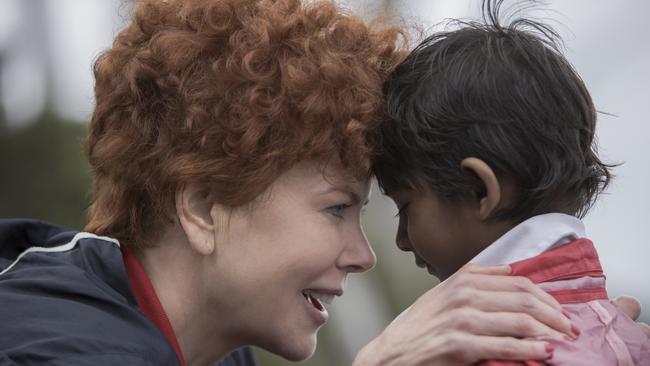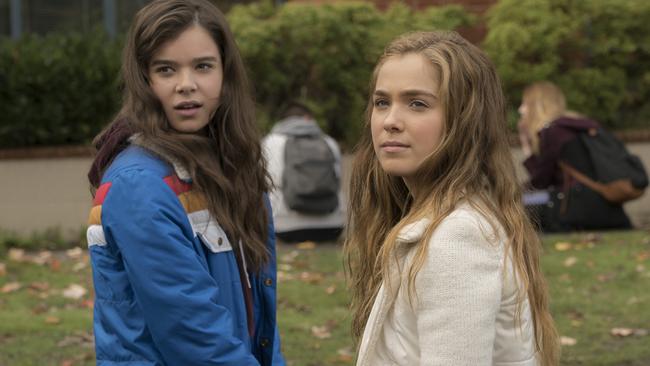Film reviews: Lion with Nicole Kidman; Edge of Seventeen
Australian film Lion has a superb cast, but there’s one actor who stands out from the rest.

For months we have been hearing about Lion, a new Australian film that wowed North American audiences in Toronto last September (but was withheld from Venice, where it also might have appealed to Europeans) and that has gained, as the result of expert publicity and occasional sneak previews, favourable word of mouth.
Lion is the feature film debut of Garth Davis, who made his reputation with TV commercials and worked with Jane Campion on the direction of the miniseries Top of the Lake. The screenplay for the film was adapted by Luke Davies from A Long Way Home, the autobiography of Saroo Brierley; Davies was author of the book and screenplay on which Candy (2005) was based and author of the beautiful screenplay about James Dean, Life (filmed by Anton Corbijn in 2015). As most people will know by now, Brierley’s journey home was not only extremely long, it was also remarkable.
Saroo was born in a tiny Hindi-speaking village in India in 1981. Like his mother and Guddu, the older brother he worships, Saroo is illiterate when, in 1986, his life undergoes a radical change. One night, while accompanying Guddu to the nearby railway yards in search of work, Saroo is separated from his brother and takes refuge on a decommissioned train that unexpectedly transports him 1600km from his home to Bengali-speaking Kolkata, where he can’t even speak the language.
Crucial to these early scenes is the casting of Sunny Pawar, a marvellously instinctive child actor who gives an indelible performance as Saroo — Abhishek Bharate is also excellent as Guddu. Little Pawar’s great, natural portrayal could go down in the film history books as one of the best examples of the work of a child actor, alongside Jean-Pierre Leaud in The 400 Blows and Anna Paquin in The Piano. Saroo is a fun-loving kid who suddenly finds himself alone and far from the simple village life he knew, far from his family, lost in a vast, crowded, noisy, dirty city where he’s unable to communicate and has to rely on his wits and the comfort of strangers. He doesn’t even know the name of his village or his family name. The child’s plight is so vividly depicted by Davis and Pawar that these scenes threaten to overshadow what follows when, after narrowly escaping the clutches of a predator, he is taken to the police and winds up in an orphanage, and is eventually adopted by an Australian couple.
We have to remind ourselves that all this is taking place in a modern country just 30 years ago because, with its scenes of poverty, child exploitation and the boy’s sheer terror and loneliness, it evokes the world of Charles Dickens and Oliver Twist. We are also forced to consider that Saroo is just one of the world’s displaced children, one of many thousands, maybe millions, who face that plight for one reason or another and who are in desperate need of kindness, understanding and basic help. Saroo’s story, as it happens, will end happily; he is one of the lucky ones.
His Australian adoptive parents are Hobart-based Sue and John Brierley (Nicole Kidman and David Wenham, both excellent), who treat this frightened, disoriented little boy with boundless love and kindness. Only many years later, as a student in Melbourne, does Saroo, now played by the charismatic Dev Patel, begin to wonder about his origins, begin to want to locate his mother and his brother. But since he doesn’t know their names or where they live, how is this possible?
It’s no reflection on these fine actors that, despite Saroo’s inventive use of Google Earth and railway timetables to supply the answers to his questions, this section of the film is less compelling than the Indian scenes that bookend it. American actress Rooney Mara seems out of place as Lucy, Saroo’s girlfriend (again, this is no reflection on a fine actress; one suspects her casting may have been a sop to the American audience), and a degree of repetition creeps in.
Fortunately, the final act delivers everything it possibly could and more — this isn’t giving anything away, since the point of a feel-good movie such as Lion is to provide a happy ending.
Though not a great film, this is a thoroughly enjoyable one. Not least of its assets is the sublime cinematography by Australian Greig Fraser (whose fine work is also on screen at present in the totally different Rogue One: A Star Wars Story), but you’ll come away remembering the infectious personality of young Sunny and the dazzling smile of his mother (Priyanka Bose).
Lion (PG)
4 stars
National release from Thursday

The Edge of Seventeen, the feature debut from writer Kelly Fremon Craig, stands out above the countless other teenage movies from recent years by virtue of its honesty and realism. Fremon Craig succeeds in forcing the viewer to empathise with her teenage protagonist and to embrace her, warts and all. She succeeds in no small measure because of the outstanding performance of former child star (True Grit) Hailee Steinfeld, who embodies the heroine with all her quirks and occasional bitchiness.
After a brief opening scene in which Nadia (Steinfeld) confronts her history teacher, Mr Bruner (Woody Harrelson), during his lunch hour with a wild story about ending her life — he has heard it all before and doesn’t take her seriously — we’re introduced to the girl at the age of seven (played by Lina Renna). She’s already a handful to her flaky mother (Kyra Sedgwick), mostly because she’s jealous of her older brother, Darian, a kid who can do no wrong as far as Mummy’s concerned. Nadine is a daddy’s girl; her father (Eric Keenleyside) spoils her and she’s devoted to him. But at school she gets bullied and is a solitary child until one day she meets Krista (Ava Grace Cooper), “dressed like a small, elderly gentleman”, and they become the closest of friends. At 13, Nadine’s life is turned upside down when her father has a fatal heart attack while he’s driving her home.
Four years later there’s another jolt when Krista (now Haley Lu Richardson) and Darian (Blake Jenner), who has grown into a handsome and popular youth, begin a relationship. For Nadine this is a complete betrayal; her closest, indeed her only, friend is abandoning her in favour of her despised brother.
You feel her pain, though Nadine isn’t always easy to embrace; she makes a lot of mistakes and, like many teenagers, she’s hopelessly self-absorbed. But this honest, witty and at times painful film transports us into her world and carries us along on her journey, difficult as it often is, with humour and insight. The performances are flawless, and the awards the film has received to date, including the shared best first feature from the New York Film Critics Circle, seem very well deserved.
The Edge of Seventeen (M)
4 stars
National release



To join the conversation, please log in. Don't have an account? Register
Join the conversation, you are commenting as Logout